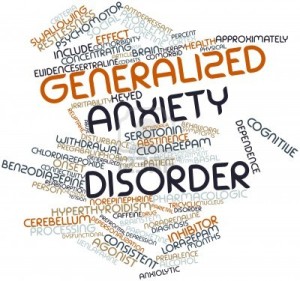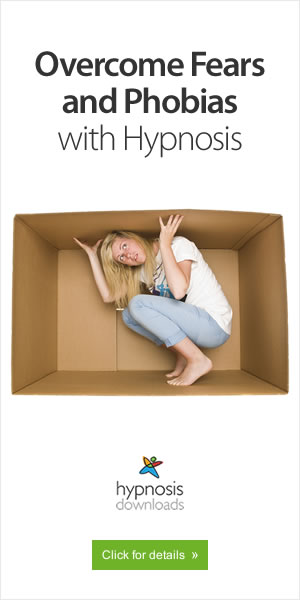Generalized Anxiety Disorder
 Generalized anxiety disorder, or GAD as it’s better known as, is a common disorder that is characterized by chronic tension, nervousness, and worrying. Unlike phobias where your fears are attributed to a specific trigger, generalized anxiety disorder is more diffused. In simpler terms, GAD gives you a general feeling of unease or dread about everything in your life.
Generalized anxiety disorder, or GAD as it’s better known as, is a common disorder that is characterized by chronic tension, nervousness, and worrying. Unlike phobias where your fears are attributed to a specific trigger, generalized anxiety disorder is more diffused. In simpler terms, GAD gives you a general feeling of unease or dread about everything in your life.
The kind of anxiety you’ll get with GAD is way less intense than a full-on panic attack but it will last longer. This is what makes living a normal life difficult. And as for relaxing … well that’s next to impossible! Whilst everyone of us will naturally be concerned about the important things from time to time, like family, work, health, and money, those with GAD will take these everyday worries to a whole new level.
The NHS defne GAD very simply as “a long-term condition which causes you to feel anxious about a wide range of situations and issues, rather than 1 specific event”. It results an a constant feeling of being anxious about many different things. As soon as one issue is resolved those with GAD will move onto the next and different issue … and the next and so on. Ask anyone with Generalized Anxiety Disorder and they’ll struggle to tell you when they last felt relaxed!
#1 Self-Help Treatment Program
Overcome Generalized Anxiety is a self hypnosis treatment program specifically for those who suffer from this kind of anxiety disorder. Follow it in your own time, it’s completely discrete and represents amazing value for money too.
Highly recommended – Find Out More >
Differentiating Normal Worry & Generalized Anxiety Disorder
We all worry from time to time. It’s completely normal to feel anxious, concerned or nervous on occasions. We may have to attend an interview, face a problem at work, address a family crisis, have money problems or need to make an important decision. To most this does not represent any major or lasting issue but to those with a generalized anxiety disorder it’s a different matter. You see the difference between normal worry and GAD is that the latter will have you experience excessive worry that is intrusive, persistent, and debilitating. For instance, after watching the evening news and hearing about terrorist threats it’s normal to feel a little worry and unease temporarily. Those with GAD will probably be up all night and will continue to worry about terrorist threats for days, constantly going over worst-case scenarios in his head.
Generalized anxiety disorder can therefore be described as a pattern of worry and anxiety relating to many events in the life of the individual which interferes with his/her ability to function normally and relax as everybody else does. It’s more common than you’d probably think – it’s actually estimated that around 7 million adults in the United States alone experience some form of generalized anxiety disorder.
GAD – The Causes
 Every case of GAD is different. Therefore, as you’d expect, there’s no one single definitive cause. Below are a few of the general triggers commonly associated with GAD:
Every case of GAD is different. Therefore, as you’d expect, there’s no one single definitive cause. Below are a few of the general triggers commonly associated with GAD:
Research suggests that GAD may run in families. Genetically you have a greater chance of developing GAD if one of your family members are known to have the disorder.
GAD is known to have been induced as a response to extreme stresses experienced in life or traumatic events (often in childhood or younger years) such as bullying, abuse or the death of a parent. Any such traumatic event can leave the individual vulnerable and prone to developing some form of anxiety.
Anxiety disorders, in many cases are known to have been introduced through alcohol abuse or dependence on certain drugs such as benzodiazepine. Tobacco smoking is an established risk factor for developing GAD and caffeine is known to aggravate anxiety.
There is also research that points out to a neurobiological cause of anxiety. Functional disruptions and connections in the amygdala (the part of the brain which controls emotions) are seen cause a difference in the manner in which anxiety and fear is processed in the brain which may lead to anxiety related disorders.
Generalized anxiety disorder can affect anyone and at any age – even children. It is however more common for women to develop GAD than men.
Generalized Anxiety Disorder Symptoms
Symptoms associated with GAD vary and fluctuate. Sometimes they are better at certain times of the day. Sometimes they are constant and sometimes you might feel like you have good days and bad days.
These symptoms can be extreme and life changing. You can’t relax or switch off because of a constant feeling of doom or being on edge and restless. The result is difficulty in concentrating on anything and constant tiredness and irritability. Left unchecked it’s common to result in a withdrawal from and avoidance of social events and contact.
There are two specific types of symptoms of GAD:
Behavioural Symptoms
Those suffering from GAD may display or experience some or all of the following behavioural symptoms. Chronic and persistent worry (often over many months) and a feeling that the anxiety has been prevalent for years. Feelings of insecurity and low self-esteem. The actions of others may be irrationally perceived as being intimidating or critical.
The mind is never free from worries which are irrationally blown out of all proportion. Dangers that are low risk or don’t exist, criticism from others which are unintended, everyday stresses that are deemed unsurmountable and a growing lack of self esteem. Going to work or school may be difficult to face, time is taken off sick, the worry increases because of this, more time is taken off sick … it’s a downward spiral which is why it needs addressing.
An affected person is unable to tolerate uncertainty, is prone to procrastination – putting off important jobs because they feel completely overwhelmed. They will avoid situations that are perceived as being associated with the anxiety, and will be unable to relax or spend time alone.
Physical Symptoms
The constant anxiety commonly results in various physical symptoms too. The knock on effects resulting in fatigue, restlessness, getting startled easily, irritability, insomnia, restless sleep, lack of concentration and muscle tightness.
Other physical symptoms include nausea, dryness of the mouth, headaches, involuntary shaking, digestive problems, diarrhoea, shortness of breath, frequent occurrence of nightmares, palpitations, etc.
GAD – The Facts And Data
According to ADAA Generalized Anxiety Disorder affects 3.1% of the US adult population each year with females being twice as likely to suffer from it than males. They estimate that only around 43% seek out treatment.
The National Institute of Mental Health report similar figures with GAD affecting 2.7% of the adult population each year and around 5.7% at some stage in their lives. Again they report it to be much more prevelnet on women (3.4%) than men (1.9%). The age group at greatest risk are those in the 30-59 year bracket.
Of those affected 32.3% had serious impairment, 44.6% moderate and in 23.1% of cases, impairment symptoms were only mild.
Dealing With Generalized Anxiety Disorder
The diagnosis of GAD is made after conducting a mental health exam and a physical exam. Tests are conducted to rule out other conditions which can cause similar symptoms.
If an individual is diagnosed with generalized anxiety disorder, the most effective treatment is usually medication in conjunction with psychotherapy. The aim of the treatment is to help the individual to function well in day-to-day life. Research has indicated that using both the methods of treatment has a lasting effect than using one method alone.
The most common class of medications that are used to treat anxiety are antidepressants including selective serotonin reuptake inhibitors (SSRIs) such as Prozac and Paxil, and the older class of tricyclic antidepressants such as Tofranil and Aventyl. These are slow to act. Benzodiazepines that are prescribed include Valium and Xanax. They are fast acting. They are prescribed during the initial stages for quick relief. However, it has to be administered under medical supervision as the patient can develop a dependence on these drugs.
Many psychotherapy techniques are seen to be useful in the treatment of GAD:
- Cognitive behavioral therapy helps the individual to recognize unreasonable thought processes and modify his/her behavior accordingly. Find Out More >
- Neuro-linguistic programming or NLP is also widely used. Find Out More >
- Exposure and desensitization helps one to overcome specific fears.
- Applied relaxation techniques help the individual to gain more control over the physical symptoms that occur during moments of extreme anxiety.
- Breathing exercises, visualization, meditation and yoga are techniques that can help.
- Biofeedback is yet another technique that uses sensors attached to the skin to recognize and control changes due to anxiety on physiological parameters such as pulse, muscle tone, temperature, etc.
- Hypnosis is also a very widely used treatment option. It can help get to the original trigger and to reprogram the mind back to thinking and reaction rationally. Find Out More >
As with most forms of anxiety and phobias, Cognitive Behavioral Therapy is perhaps the most popular and recognised treatment. If you’re intending to go this route make sure you seek out a qulaified and reputable therapist.
Generalized Anxiety Self Help Treatments
Having GAD can be very frustrating but do not lose hope because it is not impossible to manage. There are some amazing self help treatments on the market today but we have one that we particularly recommend – follow the link below to read all about it and how it works:
BEAT YOUR GENERALIZED ANXIETY
Overcome Generalized Anxiety is an effective self hypnosis treatment program specifically for those who suffer from GAD. A simple yet discrete audio download which is proven highly effective.
We recommend you Find Out More >
Get your FREE Hypnosis Course today!




